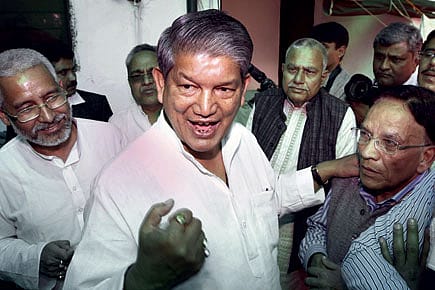Can’t the Congress Think Straight?

For all its talk of a lack of regional structure in UP, the party is destroying the one that exists in neighbouring Uttarakhand
It's an unusual crisis the Congress is facing these days. It blames the absence of an effective regional party structure when it loses assembly polls, but fritters away the same when it wins. If anything, the rebellion of Harish Rawat in Uttarakhand exposes Congress failures in forging regional party setups as much as teamwork. Intra-party politicking has reached a level where it is simply unable to nurture a regional leadership base.
Rawat's is a clear case of intra-party subjugation of a leader who has been pushed to raise a flag of rebellion. Ever since Uttarakhand was carved out of UP, he has got short shrift from the High Command, despite his hard labour for the party in his state. A Congressman who rose from the grassroots, Rawat is one of the few politicians in Uttarakhand who is acceptable across the state, which remains divided between Garhwal and Kumayun, as well as between the mountainous region and the plains. This he proved by winning the Haridwar Lok Sabha seat in 2009 after he had to leave his traditional Almora constituency. Back in 2002, after the Congress won that year's Assembly polls under his leadership, he was denied an opportunity to head the government in the state. At that time, it was ND Tewari who elbowed him out of the race for that post. This time, Harish Rawat, who had again led his party's campaign, visiting almost every constituency, expected a better deal from the High Command. But its choice of Tehri Garhwal MP Vijay Bahuguna as Chief Minister of Uttarakhand has left Rawat in the lurch.
That is exactly what the Congress High Command achieved in its stronghold of Andhra Pradesh a few years ago. In 2009, after the death of YS Rajasekhara Reddy, Jagan Mohan Reddy found himself quitting the Congress on not being made Chief Minister despite the backing of a majority of MLAs in Andhra Pradesh, a state that had for ten years been loyal to the Congress. Now, Jagan's rebellion threatens its winnability there.
A similar mess is now in the making in Uttarakhand as well. Such shocking mismanagement of its regional political bases is at odds with the High Command's diagnosis of the party's poll debacle in UP. Reacting to election results in India's biggest state, Congress General Secretary Rahul Gandhi, who had energetically led the party's campaign in the state, mentioned a lack of organisational structure as one of the main reasons for his party's dismal performance. No doubt, he also took some of the blame upon himself, saying, "I fought, so [the defeat] is my responsibility." However, a few days later, Congress President Sonia Gandhi was to be heard highlighting the other big reason put forth by her son. Talking to mediapersons, the party president admitted that the Congress' organisational structure in UP was weak. She also mentioned a poor choice of candidates as having contributed to the party's failure in the Vidhan Sabha election. Maybe, just maybe, she added, "inflation" played a role too. What's notable is that she also vowed to "correct the mistakes" that led to the party's drubbing in this round of state elections.
Modi Rearms the Party: 2029 On His Mind
23 Jan 2026 - Vol 04 | Issue 55
Trump controls the future | An unequal fight against pollution
Given such words, the party decision just a few hours later on the CM of Uttarakhand—where it was slowly inching towards power after emerging as the single largest party— is utterly inexplicable. The state party unit is no longer a unit. Not only has Harish Rawat revolted, the party for the first time here is riven along caste lines: Brahmins versus Thakurs. Vijay Bahuguna, the new CM, is a Brahmin, while Harish Rawat, the rebel, is being projected as a representative of Thakurs. Earlier, the divides were always regional, as mentioned earlier.
This development has not only activated distinct sets of Brahmin and Thakur lobbies in Uttarakhand politics, it has also offered a sliver of opportunity to the state BJP, whose leaders have started playing their own game as the Congress cracks up in Uttarakhand.
Sources in the BJP explain how two faction leaders of the saffron party are keeping up their own battle by using the Congress as fuel. BJP leader BC Khanduri, who replaced Ramesh Pokhriyal Nishank to become Chief Minister of the state just a few months before the polls, is said to be backing Vijay Bahuguna, the incoming Chief Minister picked by the High Command. Nishank, on the other hand, has made it clear that his sympathies lie with Harish Rawat in case the latter makes a bid for the top post in the state. This bodes ill for the Congress.
